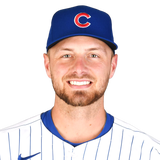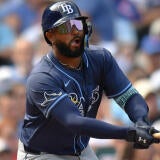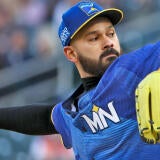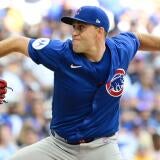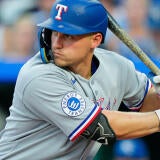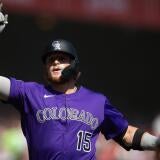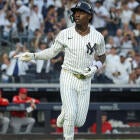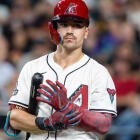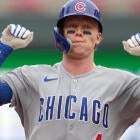| ||||||||||||

Fantasy Baseball Prospects Report: Michael Busch returns; could we see Pete Crow-Armstrong, Heston Kjerstad?
Is Jordan Lawlar so far-fetched given the rash of call-ups we've seen lately?

I really just wanted two things to happen at the trade deadline: Jonathan Aranda and Michael Busch to be traded to teams that could use them. It didn't happen for either, leaving both 25-year-olds to marinate all the more at Triple-A.
Well, now they're back in the majors, Aranda getting the call in time for last week's Prospects Report and Busch for this week's, which is what you're reading right now.
I'm tempted to copy last week's intro and just replace Aranda with Busch where necessary. Their circumstances and skill sets are so similar that almost every word would apply. But if there's one critical difference, it's this: Busch was in the lineup the very first day he was back with the big club. Aranda had to wait until the fourth day -- and he hasn't returned to the lineup since.
For those who missed my spiel on Aranda last week, the gist is that the potential is sky high but the Rays can't be trusted to put it to good use. That's exactly how it's played out so far. But already, there's hope things could play out differently for the Dodgers and Busch.
For one thing, Busch is taking the place of J.D. Martinez, a full-time DH. The opening in the lineup is one that Busch, or any other hitter, could easily fill. For another, the Dodgers lineup has its trouble spots. Left field is a platoon between David Peralta and Chris Taylor, two players with barely a .700 OPS. Busch himself has played some left field, but even if the Dodgers prefer him at his natural position, second base, they currently have a natural outfielder playing second base, Mookie Betts. Seems like a switcheroo is in order.
Of course, Busch's continued opportunities are contingent on him performing, but provided the Dodgers afford him even a modicum of patience (something that hasn't happened in previous stints), I suspect he will. He's been an on-base freak at every stop in the minors, and the power has never been in short supply either. This year marks his emergence as a full-fledged offensive force, slashing .323/.432/.615 overall. In 43 games after the Dodgers last returned him to Triple-A Oklahoma City, he hit .333 (59 for 177) with 17 homers and a 1.125 OPS.
Needless to say, he's more rosterable than any of my Five on the Verge, only one of whom (Brett Baty) is especially likely to get the call. Seeing how many call-ups catch us by surprise this time of year, as we continue to adjust to the new rhythms of last year's CBA, I'm just taking big swings and hoping to connect.
Five on the verge
(These are the prospects most worth stashing in redraft leagues.)
Pete Crow-Armstrong, OF, Cubs
2022 minors: .312 BA (423 AB), 16 HR, 32 SB, .896 OPS, 36 BB, 102 K
2023 minors: .289 BA (370 AB), 18 HR, 32 SB, .906 OPS, 41 BB, 101 K
At full length, Crow-Armstrong's hair takes on an orange hue, which is fitting since he plays like it's on fire. In other words, he's exactly the type of player who can energize a team fighting for a playoff spot. That's a lot of pressure to put on a 21-year-old with only 17 games worth of experience at Triple-A, but it doesn't sound like president of baseball operations Jed Hoyer is ruling it out.
"We'll see," Hoyer said, adding that contention allows for more aggression. "Obviously, he has a skill set that could certainly benefit us in a lot of ways. Right now, we're just focusing on his development."
That development, for what it's worth, is going well. Crow-Armstrong's production has actually improved slightly since the move up to Triple-A, and concerns about his power are gradually fading given that his swing seems optimized to get the most out of what he has.
PETE CROW-ARMSTRONG WALK OFF HOME RUN pic.twitter.com/yQzTfFkaH7
— Cubs Zone (@CubsZone) August 16, 2023
His energy mostly manifests on the base paths and in center field, where he's a clear asset defensively. The Cubs are doing fine there with Cody Bellinger and Mike Tauchman, but the former can play first base (and has more often recently) and the latter a corner spot if the Cubs choose to optimize for defense. Of course, none of Ian Happ, Seiya Suzuki or Christopher Morel actually deserves to go to the bench, which is why this may all be a pipe dream, but an injury to any of those guys could change the thinking rather quickly.
Ceddanne Rafaela, OF, Red Sox
2022 minors: .299 BA (481 AB), 21 HR, 28 SB, .880 OPS, 26 BB, 113 K
2023 minors: .304 BA (421 AB), 19 HR, 35 SB, .872 OPS, 25 BB, 97 K
The Red Sox actually did lose an outfielder to injury this week (Jarren Duran, sprained toe). Moreover, it was their primary center fielder, which is the position Rafaela can play as capably as anyone in the game. He already stood to be a major defensive upgrade even before Adam Duvall was in line for most of the reps there. But instead of calling up the 22-year-old Rafaela, the Red Sox opted for the 24-year-old Wilyer Abreu to fill Duran's roster spot.
"[Rafaela] is very versatile and he's having a great season, but I think having [Rob Refsnyder] and having Duvall in the mix, we needed the left-handed bat," manager Alex Cora said. "Raffy's time is going to come sooner rather than later."
OK, so Abreu bats left-handed, and yes, he has some exposure to center field, too. But it's unlikely he claims an everyday role the way Rafaela might have. Depending on the extent of Duran's injury, it's still possible the Red Sox eventually opt for something more permanent than Duvall. Rafaela offers a similar profile to Crow-Armstrong, having learned to get the most out of his modest raw power. He's an overly aggressive hitter, though, which some evaluators worry may catch up to him in the majors.
Heston Kjerstad, OF, Orioles
2022 minors: .309 BA (243 AB), 5 HR, .851 OPS, 29 BB, 64 K
2023 minors: .308 BA (406 AB), 19 HR, .927 OPS, 33 BB, 82 K
It may be unreasonable to think Kjerstad is next in line given that Colton Cowser is back in the minors and already on the 40-man roster. But seeing as Cowser hit just .115 (7 for 61) in his first look in the majors, the Orioles may prefer to try something else should the need arise -- a need such as Anthony Santander missing time with a back issue. The issue doesn't sound like anything that will put Santander on the IL, but the point is that something that small could be enough to punch Kjerstad's ticket. The 24-year-old has had a quiet August but continues to demonstrate impressive bat-to-ball skills for a player who was drafted second overall in 2020 mostly on the basis of his power potential. His exit velocity readings don't sell him short there either.
Brett Baty, 3B, Mets
2023 majors: .216 BA (278 AB), 7 HR, .620 OPS, 27 BB, 86 K
2023 minors: .360 BA (75 AB), 9 HR, 1.210 OPS, 11 BB, 18 K
(Yes, I realize he's not actually a prospect anymore.) I mentioned that the Orioles might want to try someone other than Colton Cowser in the outfield given how poorly his trial run went. Well, the Mets have been trying players other than Baty at third base, and wow, what a disaster. So how long before they go back to their obvious future at the position, a guy who has hit .325 (13 for 40) with four home runs in 10 games since being sent back down and who has an average exit velocity of 100 mph(!) for his entire time at Triple-A Syracuse? I predict not long. It's pretty obvious Baty has regained his confidence and deserves a chance to close out 2023 on the highest possible note, particularly since the Mets have nothing else to play for.
Jordan Lawlar, SS, Diamondbacks
2022 minors: .303 BA (389 AB), 16 HR, 39 SB, .910 OPS, 57 BB, 115 K
2023 minors: .263 BA (372 AB), 17 HR, 35 SB, .844 OPS, 51 BB, 93 K
This is one to dream on. Lawlar has had a trying season that began with him hitting just .199 (29 for 146) over the first two months. But he's hitting .305 (69 for 226) since then, homering 11 times with a .941 OPS, and recently made the jump to Triple-A, where things have gone just fine so far. It would be an aggressive move to bring the 21-year-old up now, but it might be the spark the Diamondbacks need as they fight to stay in the playoff race. They could then shift Geraldo Perdomo to third base, a position where they've gotten basically no production all year, or remove him completely now that Evan Longoria is back healthy. Lawlar is a consensus top-15 prospect who offers significant upside for Fantasy. Even if he's slow to adapt at the plate, his base-stealing prowess should make him useful.
Five on the periphery
(Here are some other prospects doing something of note.)
Lazaro Montes, OF, Mariners
2022 minors: .284 BA (176 AB), 10 HR, 1.007 OPS, 35 BB, 74 K
2023 minors: .307 BA (176 AB), 12 HR, 1.067 OPS, 42 BB, 54 K
Montes is built similarly to Yordan Alvarez and has so far modeled his career after him, growing up in Cuba before leaving to work with the same trainer in the Dominican Republic. It makes for an easy, if unfair, comparison, but lo and behold, he's beginning to produce like Alvarez, too. It's only at High-A, but what more would you expect from an 18-year-old? Since moving up from Rookie ball, Montes is batting .349 (23 for 66) with six home runs in 16 games, managing to keep the strikeouts under control. That's the big question for him as he moves up the ladder. His power is second to none, but his swing has real holes, particularly up in the zone. Still, he's passed every test with flying colors so far.
Jacob Misiorowski, SP, Brewers
2022 minors: 1.2 IP, 1 H, 1 ER, 7 BB, 3 K
2023 minors: 4-2, 3.41 ERA, 1.18 WHIP, 71 1/3 IP, 42 BB, 110 K
I've written before that Misiorowski is poised to become one of the handful of pitching prospects that everyone knows, and his latest start Aug. 15 offers the clearest evidence of that kind of potential. He allowed one hit over six innings, striking out 12. It was only his third time going five innings or more all season. Partially, that's a safety measure -- the Brewers of course want to bring him along slowly so that he doesn't break down along the way -- but it's also a reflection of genuine inefficiency. Across three levels, he has thrown just 59 percent of his pitches for strikes, issuing 5.3 BB/9. It's a classic case of a young flamethrower still learning to harness his incredible stuff, and while there's no guarantee Misiorowski ever does, now is the time to buy in.
Graham Pauley, 3B, Padres
2022 minors: .276 BA (105 AB), 4 HR, 6 SB, .879 OPS, 21 BB, 17 K
2023 minors: .304 BA (405 AB), 20 HR, 20 SB, .925 OPS, 53 BB, 83 K
Pauley wasn't thought to be much of a power hitter coming out of Duke last year. That's why he lasted to the Padres in Round 13. But all he's done in his first full professional season is mash, optimizing his launch angle and fly-ball rate for home runs. He's also been a better base-stealer than anyone expected, making him one of just nine 20/20 players in the minors so far. Between that and his solid plate discipline, he looks like he could have a future as a big-league regular. His toughest test is coming with his move up San Antonio, which is thought to be the most difficult hitting environment in all of Double-A, but then again, High-A Fort Wayne isn't exactly a hitter's paradise.
Cole Carrigg, OF, Rockies
2023 minors: .453 BA (75 AB), 3 HR, 11 SB, 1.254 OPS, 7 BB, 15 K
The outfield designation here doesn't do Carrigg justice. The Rockies' second-round pick this year has split his time almost evenly between center field, shortstop and -- in an unparalleled display of versatility -- catcher. It's rare to find a player who can handle two of those demanding positions, much less three, and it stands to reason he'll either need to direct his focus to catcher or abandon it completely before reaching the bigs. Of course, what we care about most for Fantasy purposes is his hitting, and if nothing else, it looks like he's too good for the lowest levels of the minors already. He's a bit like Garrett Mitchell was when he first entered pro ball, offering tons of athleticism but in need of real refinement to get the most out of it.
Austin Shenton, 3B, Rays
2022 minors: .236 BA (195 AB), 8 HR, 9 2B, .753 OPS, 28 BB, 70 K
2023 minors: .307 BA (381 AB), 25 HR, 36 2B, 1.009 OPS, 67 BB, 117 K
How does someone with numbers this good between Double- and Triple-A go unnoticed for so long? Suffice it to say there are many who doubt Shenton's prospect bona fides. MLB Pipeline ranks him only 27th in the Rays organization, and Baseball America left him completely out of the team's top 30 in its midseason update. There are legitimate reasons for this. One is that Shenton is already 25, though it's worth pointing out that his age-24 season was marred by a hip injury. Another is that some of the underlying data, namely the underwhelming exit velocities and dreadful zone-contact rate, give him the appearance of a Quadruple-A player. He's also yet another corner infielder in an organization that's already having trouble making room for Jonathan Aranda and Curtis Mead. Still, numbers like Shenton's shouldn't go unnoticed because there's always a chance they translate.


